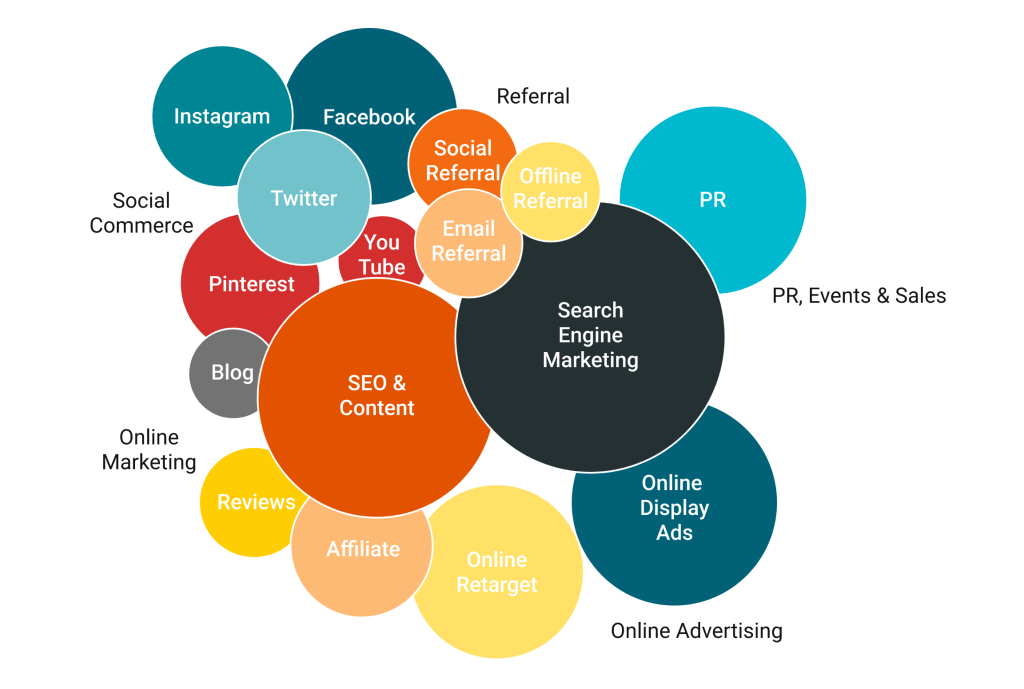
Top digital marketing channels encompass the most effective and commonly utilized online platforms, mediums, or strategies that businesses employ to promote their products, services, or brand to a specific target audience. These channels present opportunities to reach and engage with potential customers, amplify brand visibility, drive website traffic, and ultimately achieve conversions and revenue. Examples of top digital marketing channels include search engine optimization (SEO), pay-per-click advertising (PPC), social media marketing, email marketing, content marketing, influencer marketing, video marketing, and mobile marketing. Each channel provides distinct features and advantages, enabling businesses to strategically connect with their target audience and accomplish their marketing objectives.
Here are some key topics for Digital Marketing Channels:
- Search Engine Optimization (SEO): Enhancing your website and content to improve search engine rankings. For instance, optimizing meta tags, conducting keyword research, and enhancing website load speed.
- Pay-Per-Click Advertising (PPC): Running targeted ads on search engines and social media platforms to drive immediate traffic and conversions. For example, utilizing Google Ads or Facebook Ads to reach specific audiences and generate leads.
- Social Media Marketing: Utilizing popular social media platforms like Facebook, Instagram, Twitter, and LinkedIn to increase brand awareness, engage with the audience, and drive website traffic. An example includes creating engaging posts, launching targeted ad campaigns, and leveraging social media listening tools for customer sentiment analysis.
- Content Marketing: Developing and distributing valuable and relevant content, such as blog posts, videos, and infographics, to attract and engage the target audience. This may involve publishing informative blog articles, creating video tutorials or product demos, and offering downloadable guides or ebooks.
- Email Marketing: Sending targeted email campaigns to nurture leads, build customer relationships, and drive conversions. Examples include personalized newsletters, promotional offers, and automated email sequences based on customer behavior and preferences.
- Influencer Marketing: Collaborating with influential individuals or industry experts to endorse your products or services to their engaged audience. For instance, partnering with a popular social media influencer or industry thought leader to promote your brand and recommend your offerings.
- Video Marketing: Utilizing videos to engage and connect with the audience, whether through social media, video platforms, or live streaming. This can involve creating engaging product videos, sharing behind-the-scenes content, or hosting live Q&A sessions on platforms like YouTube or Instagram.
- Mobile Marketing: Optimizing marketing efforts for mobile devices, including mobile-friendly websites, apps, and SMS marketing. This may include designing mobile-responsive landing pages, creating personalized mobile apps, and sending targeted SMS campaigns to mobile users.
- Chatbots and AI-Powered Automation: Implementing chatbots or automated systems to provide instant customer support and personalized experiences. This can involve utilizing chatbots on websites or social media platforms to address common inquiries, offer product recommendations, and assist with purchases.
- Voice Search Optimization: Optimizing content and websites to be easily discoverable through voice search queries on devices like smart speakers and voice assistants. This may include incorporating conversational keywords and natural language into content and optimizing websites for voice search queries.
Remember, it’s essential to tailor your choice of digital marketing channels to your specific business goals, target audience, and industry for maximum effectiveness.
What is a Digital Marketing Channel?

A digital marketing channel refers to a specific platform, medium, or method used by businesses and marketers to promote their products, services, or brand to a target audience through digital means. These channels provide avenues for businesses to reach and engage with their customers in the online space. Digital marketing channels leverage various online platforms, technologies, and strategies to deliver marketing messages and drive desired outcomes.
Examples of digital marketing channels include:
- Search Engines: Popular search engines like Google, Bing, and Yahoo, where businesses optimize their websites and content to appear in search engine results and drive organic traffic.
- Social Media Platforms: Social media channels such as Facebook, Instagram, Twitter, LinkedIn, and YouTube, where businesses create profiles, share content, engage with users, and run targeted advertising campaigns to reach their target audience.
- Email Marketing: Utilizing email to send targeted messages, newsletters, promotions, and updates directly to a subscriber’s inbox, enabling personalized communication and customer engagement.
- Display Advertising: Placing digital advertisements, such as banners, images, or videos, on websites, mobile apps, or other digital platforms to increase brand visibility and attract potential customers.
- Pay-Per-Click (PPC) Advertising: Running paid advertising campaigns on search engines and social media platforms, where businesses bid on keywords and pay only when users click on their ads.
- Content Marketing: Creating and distributing valuable and relevant content, such as blog posts, articles, videos, infographics, and ebooks, to attract and engage the target audience, build brand authority, and drive organic traffic.
- Affiliate Marketing: Collaborating with affiliates or influencers who promote products or services on their platforms and earn a commission for each sale or referral generated.
- Influencer Marketing: Partnering with influential individuals or social media personalities to promote products or services to their dedicated followers and fan base.
- Mobile Marketing: Targeting users on mobile devices through mobile apps, SMS marketing, location-based advertising, and mobile-optimized websites to reach audiences on the go.
- Video Marketing: Leveraging video content to engage and captivate the target audience, utilizing platforms such as YouTube, social media, and video advertising networks.
- Podcasting: Creating and distributing audio content through podcasts, allowing businesses to share industry insights, thought leadership, and brand messaging.
- Search Engine Marketing (SEM): Combining organic search engine optimization (SEO) techniques and paid search advertising (PPC) to increase visibility, drive traffic, and maximize search engine presence.
- Online PR and Reputation Management: Managing online presence, public relations, and brand reputation through activities like online press releases, review management, and monitoring brand mentions.
- Chatbots and AI-powered Automation: Implementing automated chat systems, virtual assistants, or chatbots to interact with customers, provide instant support, and assist with inquiries.
- Webinars and Online Events: Hosting live or pre-recorded webinars, online workshops, or virtual events to educate and engage with the target audience, fostering brand loyalty and lead generation.
When designing a digital marketing strategy, businesses should carefully select and integrate the most relevant channels based on their target audience, marketing objectives, and budget. It’s essential to regularly evaluate and adapt the channel mix to ensure maximum reach and effectiveness in reaching and engaging the intended audience.
Thanks,






Leave a Reply
You must be logged in to post a comment.